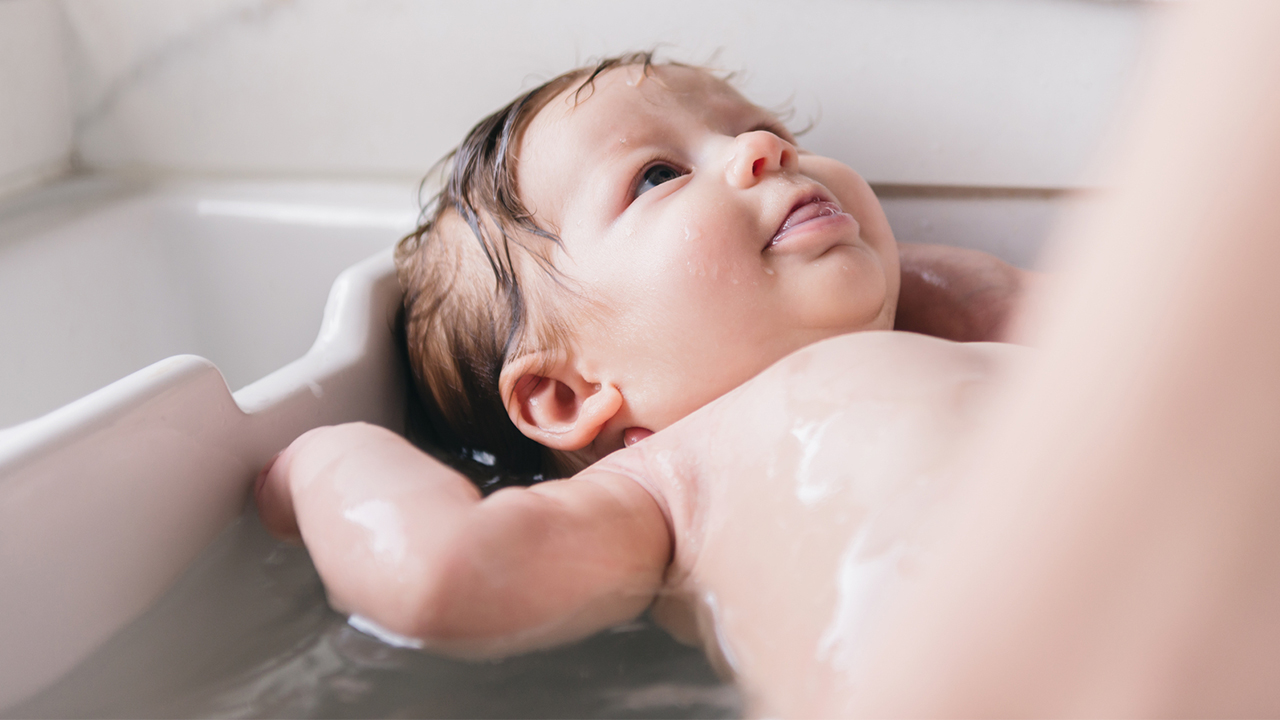Dry winter months call for a bathtime routine that takes extra special care to protect your newborn’s skin barrier.
Your baby’s oh-so-fresh skin is actually super delicate—it’s up to 30 percent thinner than an adult’s skin and it loses moisture quickly. This is especially true in the dry winter months when the humidity level drops and skin loses moisture more rapidly in general. The skin is also a barrier between your baby and the outside world and a weakened skin barrier can lead to dryness in babies. The good news is, parents can play a role in keeping their baby’s skin soft and healthy with these bathtime tips.
Delay the first bath
It used to be common for babies to get a bath shortly after birth, but this is no longer considered best practice, says Dr. Jennifer Leavitt, who works at St. Paul’s Maternity Clinic in Vancouver. “Babies are born with a protective, sticky white coating on their skin called the vernix. It’s both hydrating for newborn skin and provides some antibacterial properties as well.” After 24 hours you can bathe your baby, but you shouldn’t submerge them in water until their umbilical cord has fallen off. Until then, a sponge bath will do. Be sure to only uncover the part of your baby that you’re washing at that moment, to keep them comfortable and warm.
Don’t bathe too often
Less is more when it comes to bathing your newborn, says Dr. Jennifer Leavitt, who works at St. Paul’s Maternity Clinic in Vancouver. “Frequent bathing of a baby can lead to a weakened skin barrier and increased dryness,” says Leavitt. Short baths, under 10 minutes long, two to three times a week is sufficient. Of course, if your baby is visibly dirty with spit up or has had a poop explosion, you’re going to wash that off, but you don’t necessarily need a full bath to do so—just gently wash the soiled area with a washcloth.
Keep your baby comfortable
The bath water should be lukewarm—Leavitt suggests touching it to the inside of your wrist to ensure it is not too hot or too cold. Cold water is just unpleasant, and babies get cold faster than bigger people do. Hot water could burn them and too warm water can also break down the skin barrier. You can bathe your baby in a specially-designed infant tub, or an insert that goes into your bath—whatever works best for you and your set-up at home.
Use a gentle cleanser
“Babies absorb things really easily into their skin,” says Leavitt. That’s why she recommends to parents in her practice to choose a cleanser that’s been specifically formulated for babies, with a neutral PH level, and one that is free from fragrance, dyes and phthalates. These ingredients could irritate your baby’s skin, and could even potentially lead to skin reactions later in life. Use only a small, dime-sized amount of cleanser on your baby, and be sure to rinse it all away.
Pat and moisturize
When you take your baby out of the bath, gently pat them down with a towel, rather than vigorously rubbing them dry. Then, apply a moisturizer all over the body to replenish and protect the skin barrier. “It should be applied in a thin layer to try and avoid build-up of the moisturizer in between skin folds,” says Leavitt. She recommends looking for an emollient type of moisturizer, which creates a thin barrier on the skin to lock in moisture. Again, avoid ingredients like fragrance, dyes and phthalates. Frequent moisturizing, not just after a bath, is important for all babies, and especially important where there is a history of eczema in the family, or when your baby has dry skin.
